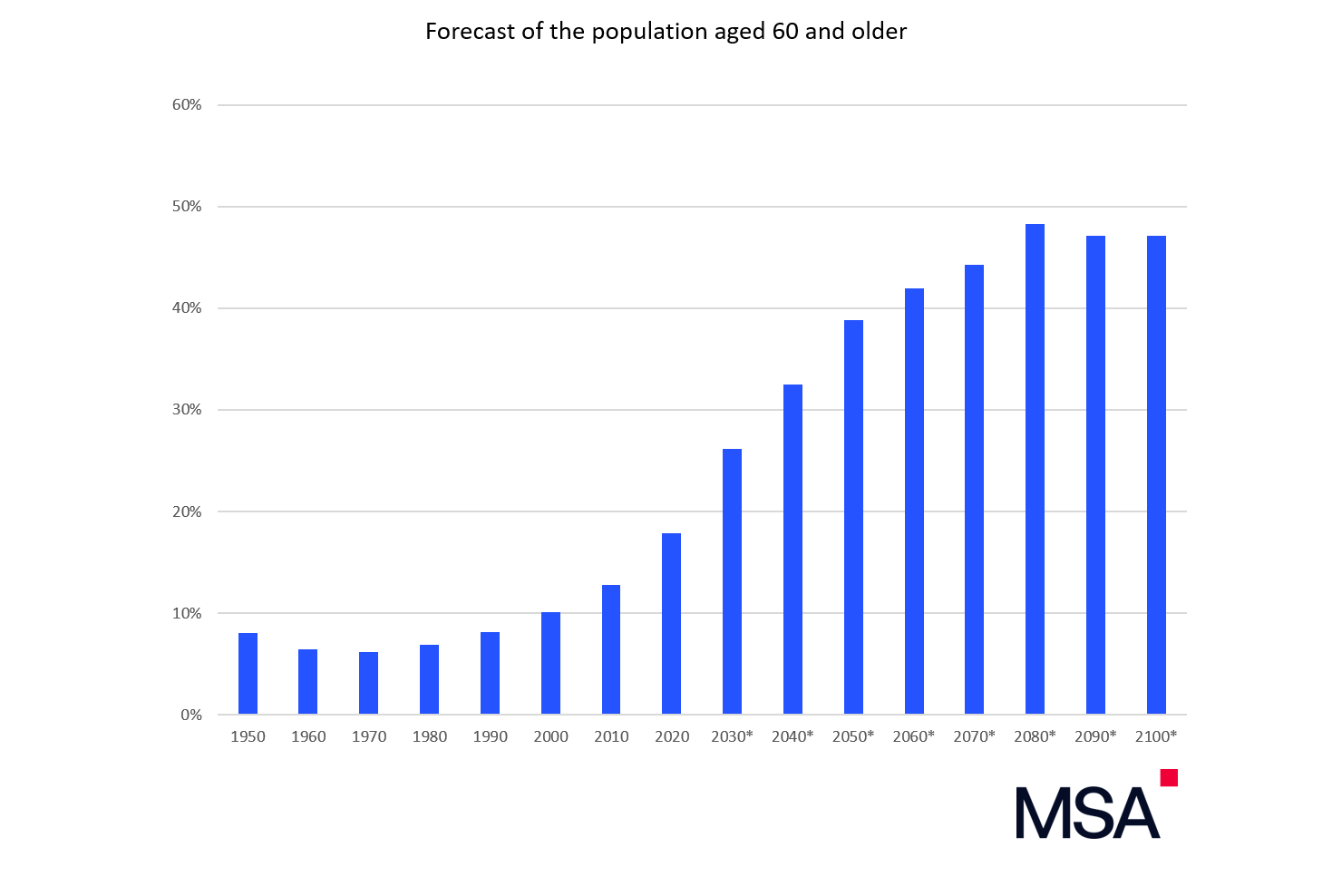China is currently facing a significant demographic crisis as its population experiences a decline for the first time in 60 years, dropping by 850,000 to a figure of 1.4 billion in 2022. This occurrence marks a pivotal moment for China, requiring the need of a fresh perspective and forward-thinking approach to address the changing demographics and plan effectively for the future.
This article examines the causes behind China’s declining population and aging, the economic and societal implications of the changing demographics, the influence on foreign businesses, and government policies aimed at addressing this issue.
Failure to address the aging population could trigger several different crises, including an increase in healthcare demands from the elderly, coupled with a decline in working-age adults who contribute to the economy that funds this care.
II. What are the Major Causes of China’s Declining Population and Aging?
- Declining birth rate
China experienced a historically low birth rate of 6.77 births per 1,000 people in 2022, the lowest level since 1949. The number of births decreased from 10.62 million in 2021 to 9.56 million in 2022.
- Increasing number of retirees
With China’s aging population, individuals aged 60 and above now make up 19.8% of the population, surpassing 260 million. If the trend of a declining working-age population continues, experts project that by 2050, the number of retirees will make up a third of the total population and could eventually exceed the working-age population by 2080.
III. What are the Direct Economic and Societal Implications of China’s Population Decline?
According to experts, elder care can cost up to three times as much as healthcare for younger generations, posing a substantial financial challenge. Relying solely on medical insurance schemes for aged care services is not a sustainable solution in the long term.
As China’s population decreases, the workforce will shrink, impacting economic growth potential, reducing tax revenues, and increasing healthcare and pension expenses for the elderly.
This strain on the social security system and resulting economic burden for future generations will worsen as the number of elderly citizens grows. Moreover, the population decline will bring about societal changes in cultural values, family structure, gender roles, and urbanization patterns.
IV. How will it Affect Foreign Businesses in China and Why is it Important?
- Labor Force and Market Environment Impacts
China’s economy and labor force plays a critical role in the global supply chain. The Chinese economy has historically relied heavily on industries that utilize low-cost labor, particularly manufacturing. However, rising wages and an increase in the cost of doing business in China is diminishing the appeal of Chinese factories. To foster innovation, China must cultivate a workforce with higher skill levels.
- Opportunities and Challenges for Foreign Companies
Foreign businesses have the potential to capitalize on the growing demand for healthcare and elderly care services. However, they may encounter obstacles in recruiting and retaining skilled workers, as well as accessing and successfully gaining a substantial part of the consumer market.
- Strategies to Allow Foreign Companies to Adapt to
Foreign companies may come across additional challenges, including heightened competition from domestic firms and shifts in consumer behavior due to changing demographics. Adapting to these circumstances may require investment in automation and technology to enhance efficiency and productivity, as well as an expansion of offerings to appeal to the elderly market. It may also require additional investment in research of the different consumer groups.
Additionally, staying aware of changing regulations and policies related to healthcare, retirement, and employment is crucial for companies to thrive in this industry.
V. Government Policies and Initiatives to Address the Declining Population and Demographic Aging
- Healthcare and Pension Reform
China is considering a phased approach to gradually raise the retirement age in response to its rapidly aging population. The plan involves initially delaying the retirement age by a few months, followed by subsequent increases.
This approach allows individuals nearing retirement age to postpone their retirement for several months. Younger individuals, however, may have to work a few years longer, but will be provided with a sufficient adaptation and transition period.
- Three-child Policy
In 2021, China introduced a new policy allowing couples to have up to three children. Alongside this three-child policy, the government also announced measures to alleviate the financial burden of raising children, including addressing educational and housing costs. Additionally, policymakers made commitments to improve maternity leave policies and safeguard the rights and interests of women in workplace.
- Supportive Measures for Eldercare
The Chinese government issued a guideline in 2021 to promote the development of elderly care services during the 14th Five-Year Plan period. The objective of this guideline is to enhance the elderly care service system and expand the range of services available, including specialized services and elderly products. Furthermore, support policies in areas such as land, housing, finance, investment, and talent will be reinforced to create a more favorable social environment for the elderly.
VI. Potential Challenges and Areas to Take Note of When Managing Digital Marketing in China
A notable challenge is the shrinking consumer market, which may restrict business growth opportunities over time as the spending power shifts. Additionally, the aging population will have different needs, and as such, require a different marketing approach that prioritizes senior-friendly designs and communication channels.
Furthermore, the government’s emphasis on promoting domestic consumption could result in stricter regulations being imposed for foreign businesses operating in China, potentially limiting the scope of digital marketing activities.
It is crucial for foreign companies to stay informed about the latest regulatory developments, ensuring compliance and avoiding penalties.
Navigating the complex regulatory environment in China and ensuring compliance can be a difficult process for foreign companies. MSA, has supported foreign invested enterprises in China for over a decade, with accounting and corporate set-up services. To ensure that your business operates successfully in China, contact us for more details!






